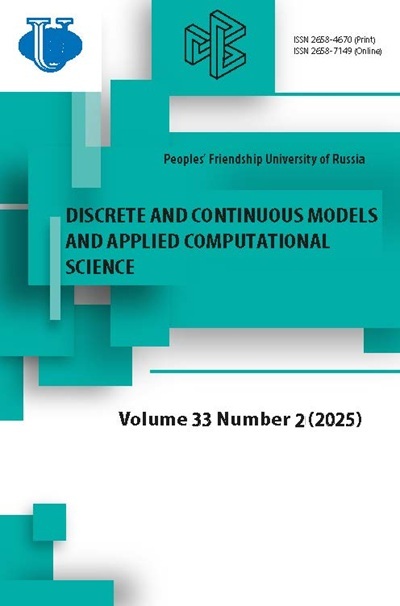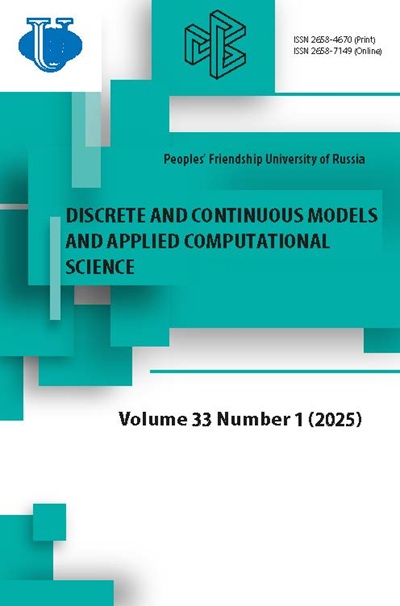Analytic projective geometry for computer graphics
- Authors: Gevorkyan M.N.1, Korolkova A.V.1, Kulyabov D.S.1,2, Sevastianov L.A.1,2
-
Affiliations:
- RUDN University
- Joint Institute for Nuclear Research
- Issue: Vol 33, No 1 (2025)
- Pages: 74-102
- Section: Modeling and Simulation
- URL: https://journals.rcsi.science/2658-4670/article/view/315395
- DOI: https://doi.org/10.22363/2658-4670-2025-33-1-74-102
- EDN: https://elibrary.ru/AAAAHV
- ID: 315395
Cite item
Full Text
Abstract
The motivation of this paper was the development of computer geometry course for students of mathematical specialties. The term “computer geometry” hereafter refers to the mathematical foundations of machine graphics. It is important to emphasize separately that this course should be designed for second-year students and, therefore, they can only be required to have prior knowledge of a standard course in algebra and mathematical analysis. This imposes certain restrictions on the material presented. When studying the thematic literature, it was found out that the de facto standard in modern computer graphics is the use of projective space and homogeneous coordinates. However, the authors faced a methodological problem-the almost complete lack of suitable educational literature in both Russian and English. This paper was written to present the information collected by the authors on this issue.
About the authors
Migran N. Gevorkyan
RUDN University
Email: gevorkyan-mn@rudn.ru
ORCID iD: 0000-0002-4834-4895
Scopus Author ID: 57190004380
ResearcherId: E-9214-2016
Candidate of Sciences in Physics and Mathematics, Associate Professor of Department of Probability Theory and Cyber Security
6 Miklukho-Maklaya St, Moscow, 117198, Russian FederationAnna V. Korolkova
RUDN University
Email: korolkova-av@rudn.ru
ORCID iD: 0000-0001-7141-7610
Scopus Author ID: 36968057600
ResearcherId: I-3191-2013
Docent, Candidate of Sciences in Physics and Mathematics, Associate Professor of Department of Probability Theory and Cyber Security
6 Miklukho-Maklaya St, Moscow, 117198, Russian FederationDmitry S. Kulyabov
RUDN University; Joint Institute for Nuclear Research
Email: kulyabov-ds@rudn.ru
ORCID iD: 0000-0002-0877-7063
Scopus Author ID: 35194130800
ResearcherId: I-3183-2013
Professor, Doctor of Sciences in Physics and Mathematics, Professor. of the Department of Probability Theory and Cyber Security of RUDN University; Senior Researcher of Laboratory of Information Technologies, Joint Institute for Nuclear Research
6 Miklukho-Maklaya St, Moscow, 117198, Russian Federation; 6 Joliot-Curie St, Dubna, 141980, Russian FederationLeonid A. Sevastianov
RUDN University; Joint Institute for Nuclear Research
Author for correspondence.
Email: sevastianov-la@rudn.ru
ORCID iD: 0000-0002-1856-4643
Scopus Author ID: 8783969400
ResearcherId: B-8497-2016
Professor, Doctor of Sciences in Physics and Mathematics, Professor of Department of Computational Mathematics and Artificial Intelligence of RUDN University
6 Miklukho-Maklaya St, Moscow, 117198, Russian Federation; 6 Joliot-Curie St, Dubna, 141980, Russian FederationReferences
- Sulanke, R. & Onishchik, A. L. Projective and Cayley-Klein Geometries 450 pp. (Springer, 2006).
- Rosov, N. K. Felix Klein and his Erlangen program. Russian. Mat. Pros. 3, 49-55 (3 2019).
- Volberg, O. A. Basic ideas of projective geometry 3rd ed. Russian. 188 pp. (State Educational and Pedagogical Publishing House of thу Ministry of Education of the RSFSR, Moscow, 1949).
- Coxeter, H. S. M. The Real Projective Plane (1955).
- Ponarin, Y. P. Affine and projective geometry Russian. 288 pp. (MCCME, Moscow, 2019).
- Prasolov, V. V. & Tikhomirov, V. M. Geometry Russian. 336 pp. (MCCME, Moscow, 2019).
- Young, J. W. Projective Geometry 184 pp. (1938).
- Shcherbakov, R. N. & Pichurin, L. F. From projective geometry to non-Euclidean geometry (around the absolute) Russian. 158 pp. (Prosveshchenie, Moscow, 1979).
- Baer, R. Linear Algebra and Projective Geometry 399 pp. (New York, 1952).
- Artin, E. Geometric Algebra 214 pp. (Interscience Publishers, New York, 1957).
- Busemann, H. & Kelly, P. J. Projective geometry and projective metrics 352 pp. (Courier Corporation, New York, 2012).
- Roger, D. F. & Adams, J. A. Mathematical elements for computer graphics 611 pp. (1990).
- Ammeraal, L. Programming Principles in Computer Graphics 233 pp. (John Wiley and Sons, 1992).
- Shikin, E. V. & Boreskov, A. V. Computer graphics Polygonal models. 464 pp. (Dialog-MIFI, Moscow, 2001).
- Marschner, S. & Shirley, P. Fundamentals of Computer Graphics 5th ed. 717 pp. (CRC Press, 2022).
- Vince, J. Rotation transforms for computer graphics 1st ed. 232 pp. (Springer-Verlag London, 2011).
- Golovanov, N. N. Geometric modeling Russian. 472 pp. (Fizmatlit, Moscow, 2002).
- Dunn, F. & Parberry, I. 3D Math Primer for Graphics and Game Development 2nd ed. 846 pp. (CRC Press, 2011).
- Nikulin, E. A. Computer geometry and machine graphics algorithms Russian. 560 pp. (BHV- Petersburg, Saint-Petersburg, 2003).
- Cisarzh, V. V. & Marusik, R. I. Mathematical methods of computer graphics Russian. 464 pp. (Fakt, Kiev, 2004).
- Siciliano, B., Sciavicco, L., Villani, L. & Oriolo, G. Robotics. Modelling, Planning and Control 632 pp. (Springer-Verlag, London, 2010).
- Faux, I. D. & Pratt, M. J. Computational Geometry for Design and Manufacture 329 pp. (1980).
- De Berg, M., Cheong, O., van Kreveld, M. & Overmars, M. Computational Geometry Algorithms and Applications (Springer Berlin Heidelberg, 2008).
- Boreskov, A. V. Computer graphics programming. Modern OpenGL Russian. 372 pp. (DMK Press, Moscow, 2019).
- Manevich, V. A., Kotov, I. I. & Zengin, A. Analytical geometry with image theory Russian. 304 pp. (Vysshaya shkola, Moscow, 1969).
- Dimentberg, F. M. The Screw Calculus and Its Applications in Mechanics 162 pp. (Foreign Technology Division translation, 1965).
- Kotelnikov, A. P. The helical number and some of its applications to geometry and mechanics Russian. 222 pp. (ComKniga, Moscow, 2019).
- Chelnokov, Y. Biquaternion solution of the kinematic control problem for the motion of a rigid body and its application to the solution of inverse problems of robot-manipulator kinematics. Mechanics of Solids 48, 512. doi: 10.3103/S0025654413010044 (Apr. 2013).
- Hartley, R. & Zisserman, A. Multiple View Geometry in Computer Vision 2nd ed. 655 pp. (Cambridge University Press, Cambridge, 2004).
- Lengyel, E. Foundations of Game Engine Development. 1: Mathematics 4 vols. 195 pp. (Terathon Software LLC, Lincoln, California, 2016).
- Hammerlindl, A., Bowman, J. & Prince, T. Asymptote. The Vector Graphics Language https://asymptote.sourceforge.io/ (2023).
- Kryachkov, Y. G. Asymptote for beginners. Creating drawings in the language of vector graphics Asymptote Russian. http://mif.vspu.ru/books/ASYfb.pdf (2020).
- Volchenko, Y. M. Scientific graphics in the Asymptote language Russian. http://www.math.volchenko.com/AsyMan.pdf (2020).
- Tedeev, V. A. From painting to projective geometry Russian. 231 pp. (Visha Shkola, Moscow, 1988).
- Hartshorne, R. Foundations of projective geometry 161 pp. (W. A. Benjamin inc., New York, 1967).
- Ilyin, V. A. & Poznyak, E. G. Analytical geometry Russian. 232 pp. (Nauka, Moscow, 1981).
- Fedorchuk, V. V. Analytical Geometry and Linear Algebra course Russian. 328 pp. (MSU, Moscow, 1990).
- Savelov, A. A. Flat curves. Taxonomy, properties, and applications Russian. 293 pp. (State Publishing House of Physico-mathematical Literature, Moscow, 1960).
- Gevorkyan, M. N., Korolkova, A. V., Kulyabov, D. S. & Sevastyanov, L. A. Implementation of Analytic Projective Geometry for Computer Graphics. Programming and Computer Software 50, 153-165. doi: 10.1134/S0361768824020075 (Apr. 2024).
Supplementary files










